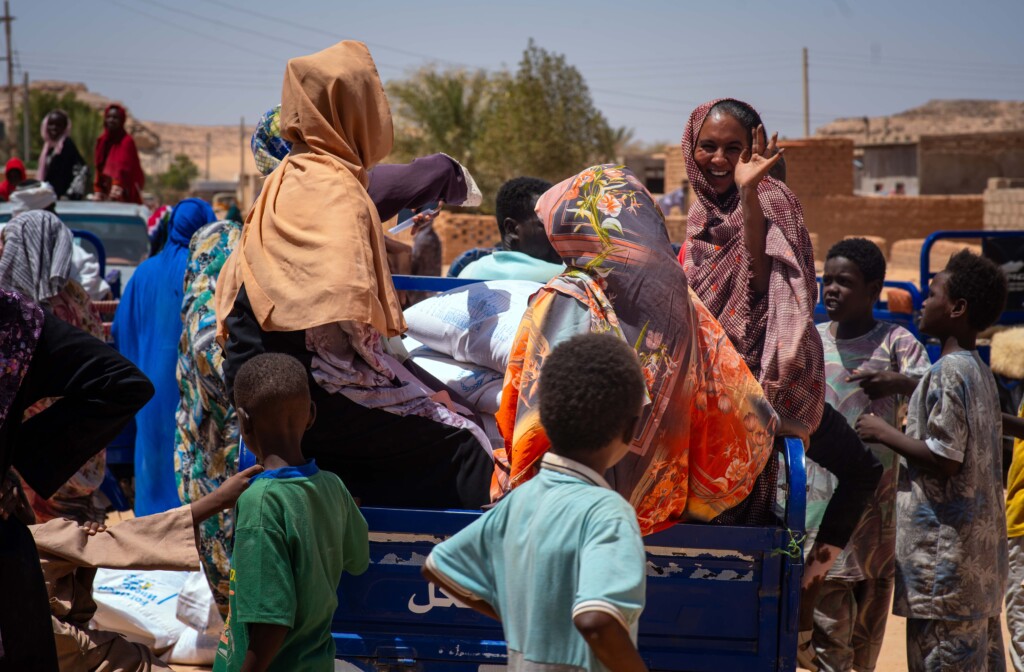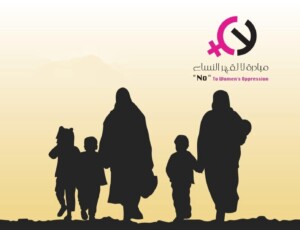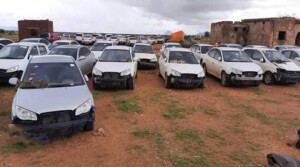STPT report: ‘Civilians pay the ultimate price’ in Sudan’s war

A displaced family in Sudan with provisions they received during a distribution in Wadi Halfa (Photo WFP / Abubakar Garelnabei)
In its latest report, the Sudan Conflict Monitor warns that “Sudan’s warring elites are entrenching divisions while civilians pay the ultimate price.” The publication, produced by the Sudan Transparency and Policy Tracker, Ayin Network, and the Human Rights Hub, details famine, massacres, and deepening political manoeuvring across the country, and was released yesterday.
On 18 August, Lt Gen Abdelfattah El Burhan, head of the Sovereignty Council and commander-in-chief of the Sudanese Armed Forces (SAF) ordered sweeping military reshuffles, retiring dozens of top officers and moving Sudan’s auxiliary forces under the 2007 Armed Forces Act. The Monitor notes: “Without efforts to dissolve these forces and rebuild the army on professional foundations, such measures are largely symbolic.”
North Darfur’s capital of El Fasher remains under siege, with the paramilitary Rapid Support Forces (RSF) launching repeated assaults on the city. According to the report: “On 11 August, an RSF attack on Abu Shouk camp killed at least 40 civilians, while artillery and drone strikes have caused widespread casualties.”
The Integrated Food Security Phase Classification (IPC) has confirmed famine: “Families are eating animal feed to survive, and children are dying daily from malnutrition.”
Across Kordofan, fighting has escalated. The Monitor states: “The RSF has consolidated control over El Obeid, while battles in Bara and Umm Sumima have claimed hundreds of lives.” The Shaq El Noum massacre in North Kordofan was described as “one of the deadliest single incidents of the war, with as many as 450 people killed.”
The conflict is driving new militia formations. The Monitor highlights how defector “Abu Agla Keikil, Sudan Shield Forces and Mohamed Seid Ahmed ‘Al Jakomi’ have forged an alliance, with Jakomi seeking to build a 50,000-strong force with Eritrean support.” Analysts warn such moves entrench ethnic and regional militarisation.
Political divisions are also deepening. Since his May appointment, Sudanese Prime Minister Kamil El Tayeb Idris has filled most cabinet posts, but according to the report: “Many of these appointments reinforce Islamist influence and strengthen the war economy.”
RSF-led rival government, Sudan Founding Alliance (Tasees), declared in July, “remains largely symbolic and non-functional.”
The humanitarian crisis is worsening. The Monitor records that “Food riots erupted in Kadugli in July as traders hoarded sorghum,” while USAID funding cuts have stripped health facilities of medicines and undermined refugee support in Chad. Cholera has spread across 17 states, with “over 94,000 cases and at least 2,370 deaths.”
Aid workers are increasingly under threat. On 20 August, an armed group attacked a World Food Programme convoy in North Darfur. The Monitor warns: “Since the war began, at least 160 health workers have been killed, two-thirds of them in RSF-controlled areas.”
Read the full report here: Sudan Conflict Monitor: #22 August 21, 2025











 and then
and then